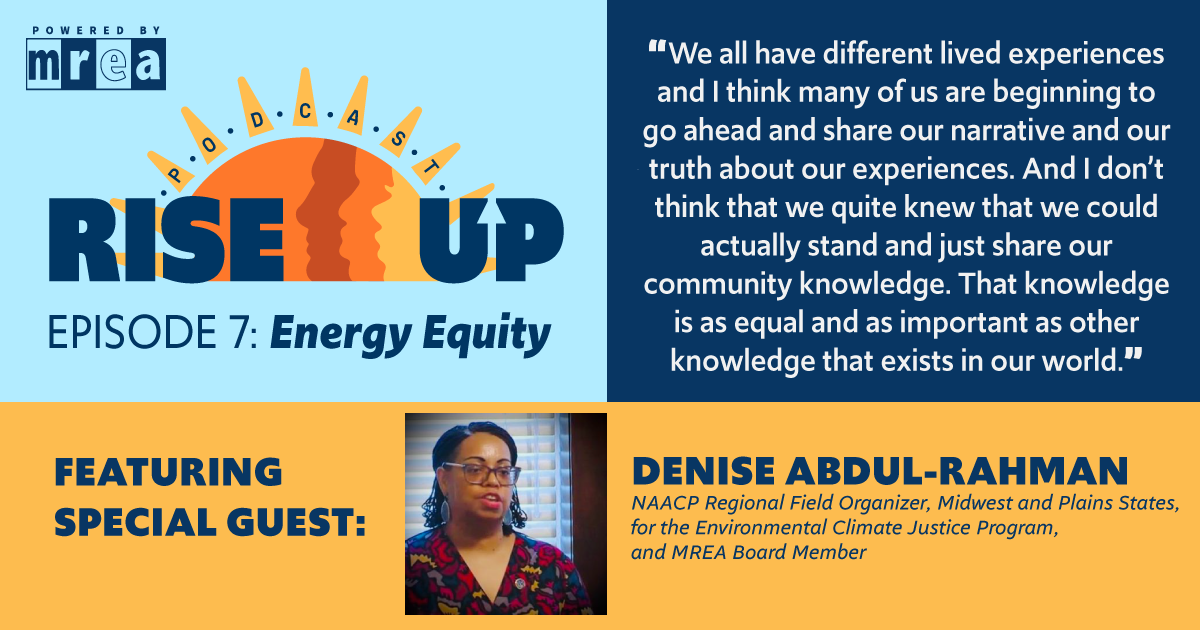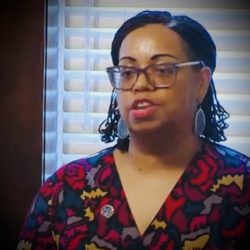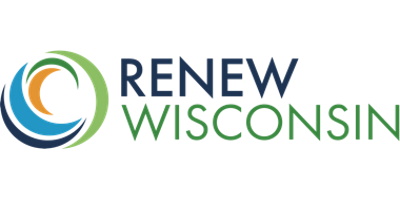
ENERGY EQUITY
Season 1: Episode 7
Nick Hylla, MREA Executive Director
Jordan Pupols, MREA Events Manager
Guests:
Episode Resources:
Subscribe:
Signing up for our Action Alerts means you’ll be alerted as soon as the latest episode is available for listening on our website.
About This Epis0de
Have you heard of the Opportunity Atlas? We’ll forgive you if you haven’t, though you probably should check it out. It’s a tool built from following 20 million U.S. children, those born between 1978 and 1983, into their mid-thirties to identify how their childhood zip code impacted their success as adults. It is likely the most ambitious and definitive study on the concept of “The American Dream.” The results are both sobering and promising:
In nearly every place in the country, children whose parents were low-income tended to have poorer-than-average outcomes as adults. But it’s also important to note that the factors that inhibit mobility are within society’s control to influence – schools, violence, incarceration, housing, job access, and quality health care are some of the reasons that zip codes and census tracts matter for life outcomes. And these factors can be improved with the appropriate investment and good policy.
With 7.8 million U.S. families falling into poverty since June alone, these conclusions hold a dire warning for the future of the U.S. economy. If we want our children and grandchildren to live in a country defined by widespread prosperity, promise, and opportunity, then we need to prioritize our investments to support communities in need. The research also makes clear that creating this future is up to us, as each of the barriers for mobility can be addressed with good public policy.
When it comes to energy policy, a focus on energy equity could underwrite a nationwide jobs and economic development resurgence. This “Just Energy Transition” is defined by the widespread deployment of energy efficiency and distributed energy resources with a priority focus on career training and re-training for underemployed individuals. This re-imagining of our energy economy will require dialogue, community conversations, stakeholder engagement, and informed policy.
Today’s guest, Denise Abdul-Rahman, helps us navigate some of these conversations. Her work as a regional field organizer with the NAACP has her focused on the just energy transition, tackling issues of energy equity in Midwest communities. Her diverse background and experience give her an informed understanding that includes human health and wellness, workforce training, social and climate policy, and advocacy. And, the budding NAACP ‘Power Up’ program is starting to show some results and help chart a path for clean energy jobs for all.
SPECIAL GUEST: Denise Abdul-Rahman –
NAACP Regional Field Organizer, Midwest and Plains States, for the Environmental Climate Justice Program
 Denise Abdul-Rahman is a staff member of the National NAACP Environmental Climate Justice Program (ECJP), as the Regional Field Organizer for the Midwest and Plain States and serves as the Environmental Climate Justice Chair of the Indiana State Conference of the NAACP. She employs the program’s three objectives: Reduce Harmful Emissions, Particularly Greenhouse Gases; Advance Energy Efficiency and Clean Energy; and Strengthen Community Resistance and Livability.
Denise Abdul-Rahman is a staff member of the National NAACP Environmental Climate Justice Program (ECJP), as the Regional Field Organizer for the Midwest and Plain States and serves as the Environmental Climate Justice Chair of the Indiana State Conference of the NAACP. She employs the program’s three objectives: Reduce Harmful Emissions, Particularly Greenhouse Gases; Advance Energy Efficiency and Clean Energy; and Strengthen Community Resistance and Livability.
Denise holds a BS in management, an MBA in healthcare management, and a health informatics designation from Indiana University School of Informatics.
Her accomplishments include organizing over 85 attendees, representing several organizations across the Midwest to the United States EPA, Region V to present the “Our Power Plan,” as well as organizing the “Just Energy” Campaign. Denise called for Indianapolis Power Light to stop burning coal by 2016 and the plant stopped February 2016, and she led a contingent that was crucial to the defeat of House Bill 1320, a bill that sought to depict a narrative that ‘solar was unfair to people of color/African Americans and therefore a fee to distribute energy across the grid should be enforced to make it fair for all. The “Just Energy’ Campaign solidified the defeat and the victory rose to national coverage with LA Times and Bloomberg News.
She has had the privilege to speak and work with various academic institutions: DePauw University, IU McKinney School of Law, IUPUI School of Sociology, Purdue University, Indiana State University, IU-Bloomington, Smith (Popular Economics Summer Institute), Butler, and Wayne State-Law School. Denise provided a Keynote address for University of Chicago at Illinois (Freshwater Lab Summit), AALS Clinical Education conference, Global Citizen Year at Stanford University, Duke University, and IUPUI Richard Lugar Renewable Energy Center.
She has served as a Delegate to the Paris COP 21, as a Delegate to the Global Climate Action Summit, as the former Vice Chair for the Indianapolis Air Pollution Control Board, and as an advisor for the Thrive Indianapolis Climate Action Plan.
Denise has received the Faith Based Rev. Mozel Sanders Drum Major for Humanities Award 2020, the Indiana University Robert McKinney School of Law Environmental Protector Award 2019, and the NAACP Indiana Hazel B. Hunter Award 2019.
EPISODE RESOURCES:
On Denise’s Work:
NAACP: Just Energy Policies and Practices: Includes resources on how to take action, a Just Energy Policies and Practices Action Toolkit , and a training Webinar and Facilitator’s Guide.
NAACP: Environmental and Climate Justice: Race is the number one indicator for the placement of toxic facilities in this country.
Q&A: NAACP climate justice organizer on ‘black to green’ employment pipeline: A new program led by organizers in Indiana offers solar installation and energy efficiency training in marginalized communities.
NAACP: Find Your Local Unit With over two thousand local units nationwide, it is easy to get involved with the NAACP in your community. Use the listing below and find a unit close to you.
NAACP: Become a Member: Take a stand. Answer the call for equality. Answer the call for civil rights. Join the oldest and boldest civil rights organization in the nation.
On Equity Training:
Building the “Black to Green” Pipeline – December 11, 2020: In Evansville, Indiana, the NAACP and IBEW are training Black people for work in the clean energy industry, aiming for an equitable transition away from fossil fuels
Help Create a Just Energy Transition: MREA is partnering with four organizations dedicated to environmental and climate justice to bring industry leading solar technical training and workforce development opportunities to their member-led communities.
Evansville, Indiana Climate Action Plan (CAP): By 2050, Evansville will be a regional leader in equitably addressing climate change and a zero-waste community, powered by renewable energy, where all people have access to efficient transportation alternatives, public green spaces, clean air and water, and locally sourced, fresh food.
On Relevant News:
“[African Americans] paid […] $41 billion to the energy sector, […] yet only hold 1% of the energy jobs so we really see this as a keen opportunity to infuse what we call a black-green pipeline, or to make sure that our communities are able to participate in the up and coming and inevitable green economy.”
-Denise Abdul-Rahman
‘Food is More Important Right Now’:COVID-19 Forces Some to Struggle Paying Energy Bills – Aug. 2020
New York is Spending $1 Billion to Help Residents Conserve Energy – And Lower Their Bills – Aug. 2020
Nearly 8 Million Americans Have Fallen into Poverty Since the Summer – Dec. 2020.
PSC Extends Utility Shutoff ban Through April; 10,000 Could Lose Water Service This Fall – Sept. 2020
Two Words That Define the Relentless Bull Market as a Reckoning Takes Shape – Dec. 2020
This Episode Brought to You By:
RENEW Wisconsin’s tenth annual Renewable Energy Summit will be hosted virtually over three days from Tuesday, January 12th through Thursday, January 14th, 2021. The theme of the event, “Building the Clean Energy Mosaic,” will highlight the diversity of technologies, people, and scale needed to shape our clean energy future and feature keynote addresses from Abby Hopper (SEIA) and Sandra Henry (Elevate Energy).
CoVantage Cares Foundation isn’t just passionate about providing great financial services, but also about supporting the Wisconsin and Michigan communities. Every year, they contribute thousands of dollars and provide hands-on support to organizations that assist residents facing financial challenges and improve the quality of life and long-term viability of our communities.
For more information on how your organization can sponsor a future Rise Up podcast episode, view the details on the Rise Up Midwest supporter page, or contact Gina.

CONTACT US
Address: 7558 Deer Rd. Custer, WI 54423
Email: info@riseupmidwest.org
Phone: (715)-592-6595
The Midwest Renewable Energy Association (MREA) is a nonprofit organization with the mission to promote renewable energy, energy efficiency, and sustainable living through education and demonstration.


